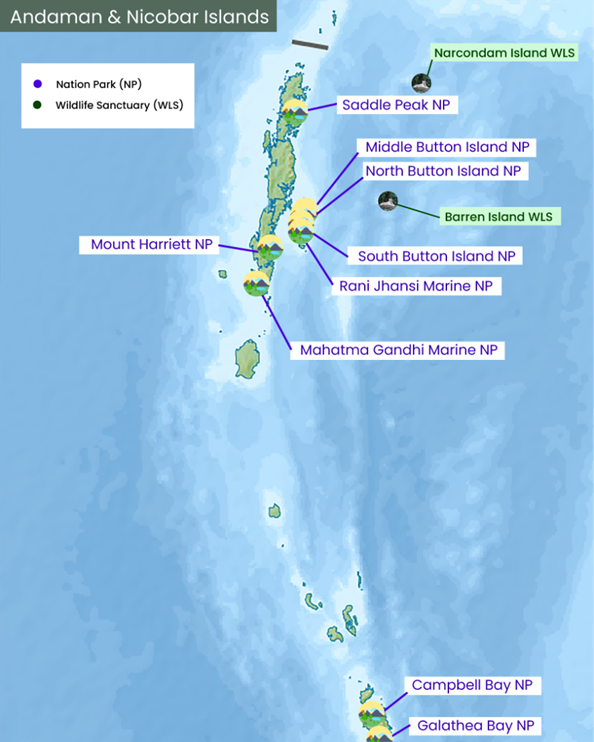EMPOWER THE GUARDIANS OF THE EARTH, DO NOT ROB THEM
Relevance:
- GS 1 – Salient features of Indian Society, Diversity of India
- GS 3 – Conservation, environmental pollution and degradation, environmental impact assessment.
Why in the News?
- Unilateral decision to establish three wildlife sanctuaries in the Southern Nicobar.
- Impacts the indigenous peoples by depriving them of their ancestral territories.
- Jeopardizes the indigenous way of life and lifeways.
About the News:
- Southern Nicobarese spread across islets and islands using canoes and boats.
- Each island connected to traditional ownership and resource management, showcasing deep-rooted land and sea connection.
- Indigenous islanders sustained themselves for millennia, adapting to external markets after forced relocation post-tsunami.
- Transition to market reliance presented challenges despite demonstrated adaptability.
- Shompen men and women consulted by NITI Aayog sub-committee.
- Expressed strong desire to reside undisturbed within their forest habitats, free from outsider interference.
- Profound desire to return to traditional homelands, free from tourism and external influences.
Southern Andaman and Nicobar Islands
- Located off the shores of Little Nicobar, seven tiny islands are classified as “uninhabited” by the government.
- Integral to the indigenous communities of the region, particularly the Payuh, the indigenous southern Nicobarese peoples.
- Island Names and Indigenous Recognition: Officially known as Meroë and Menchal.
- Referred to as Piruii and Pingaeyak by the Payuh, with traditional rights over these and other islets.
Historical Importance and Spiritual Beliefs
- For millennia, the indigenous communities have relied on these islands for sustenance and protected them.
- Menchal is spiritually revered as Pingaeyak, a spirit believed to reside on the island, which prohibits overexploitation and harm to its ecosystem.
- Meroë is believed to be the abode of a legendary islander community, with spiritual beliefs guiding resource use and protection.
Management and Conservation
- Managed by community elders acting as guardians and specific individual caretakers.
- Ensure protection of the island’s resources and sustainability.
- Contemporary terms for this practice include “conservation” and “sustainable use”.
Conservation Colonialism in Andaman and Nicobar Islands
- Unilateral Establishment of Wildlife Sanctuaries: In May 2022, the Andaman and Nicobar (A&N) administration issued three public notices to establish wildlife sanctuaries.
- Coral sanctuary at Meroë Island
- Megapode sanctuary at Menchal Island
- Leatherback turtle sanctuary on Little Nicobar Island
- Disregard for Indigenous Land Rights: In mid-July, the A&N administration claimed
- No claims or objections were received regarding the proposed sanctuary areas.
- No individual holds rights within the proposed sanctuary boundaries.
- Restrictions will be imposed on neighboring area people from entering these islands “in the national interest.”
- Indigenous Southern Nicobarese Rights and Consultation
- Approximately 1,200 southern Nicobarese inhabit Patai Takaru (Great Nicobar Island) and Patai t-bhi (Little Nicobar Island).
- They hold traditional rights over both inhabited and “uninhabited” islands.
- The A&N administration did not consult or inform the southern Nicobarese about its plans.
- Community Concerns and Ignored Pleas: Despite verbal supplications and a letter in August 2022 from the Little & Great Nicobar Tribal Council expressing community concerns
- A&N administration proceeded to issue official notifications in October 2022.
- Designated the whole of Meroë (2.73 sq. km, including surrounding marine area) and Menchal (1.29 sq. km) as wildlife sanctuaries.
- Designated a 13.75 sq. km area (including 6.67 sq. km of water area within the baseline system) on Little Nicobar (total 140 sq. km) as a wildlife sanctuary.
Masking an Ecological Disaster in Andaman and Nicobar Islands
- Arbitrary Selection of Conservation Reserves: Meroë and Menchal Islands selected for conservation of coral reefs and Megapode birds without clear justification.
- Menchal has only a pair or two of the endemic Megapode birds.
- Uncertainty about the actual diversity and abundance of corals on Meroë Island.
- Timing and Scrutiny: Announcement of wildlife sanctuaries coincided with criticism over the denotification of Galathea Bay Wildlife Sanctuary.
- Denotified for a ₹72,000-crore mega project on Great Nicobar, a UNESCO Biosphere Reserve.
- Environmental and Social Impact of the Mega Project: Project will cause extensive environmental and social damage
- Devastation of 8 to 10 lakh evergreen forest trees.
- Destruction of numerous coral reefs along Galathea Bay.
- Loss of nesting site for the globally endangered Leatherback sea turtle species.
- Destruction of hundreds of Nicobar Megapode nesting mounds.
- Killing of numerous crocodiles.
- Impact on Indigenous Communities:
- Prevents indigenous Great Nicobar islanders from returning to their pre-tsunami homeland.
- Traditional activities included husbandry of pigs and chickens, cultivation of coconut and betel nut trees, and simple communal living.
- Displacement of three or more settlements of the Shompen, a ‘Particularly Vulnerable Tribal Group’.
- Permanent destruction of their foraging and hunting grounds.
- Disregard for Indigenous Significance: Unilateral decision to establish wildlife sanctuaries overlooks the islands’ profound significance to the indigenous population.
- Ancestral lands unjustly perceived as “no-man’s-land” to appease conservationists, investors, and public opinion.
Uphold Indigenous Rights as Earth’s Guardians
- Global Violation of Indigenous Rights
- Governments worldwide violate indigenous people’s rights by evicting them from ancestral lands.
- Often justified under the guise of development, national interest, or conservation projects.
- Significance of Indigenous Peoples: Approximately 476 million indigenous peoples make up about 6% of the global population.
- Indigenous territories encompass roughly 22% of the planet’s land surface.
- These territories harbor 80% of the world’s biodiversity.
- Indigenous Peoples as Earth’s Original Guardians
- Indigenous communities have traditionally acted as stewards of the earth.
- The world should learn from their wisdom and sustainable practices.
- Support and Empower Southern Nicobar Islanders
- In southern Nicobar, reason and justice dictate that we support and empower the islanders.
- They should continue to steward their ancestral territories.
- It is unjust to rob them of their lands, resources, lifeways, and worldviews.
Mains question
Discuss the concept of “Conservation Colonialism” with reference to the establishment of wildlife sanctuaries in the Andaman and Nicobar Islands. (250 words)




